Analyzing SMEs Development and Youth Empowerment in Nigeria
VerifiedAdded on 2022/08/20
|20
|5362
|17
Report
AI Summary
This report investigates the impact of Small and Medium Enterprises (SMEs) on youth empowerment in Nigeria. It explores the crucial role SMEs play in job creation, poverty reduction, and economic development, particularly addressing the high unemployment rates among Nigerian youth. The report delves into the concept of SMEs and youth empowerment, examining how innovation within SMEs can lead to economic growth and how youth empowerment initiatives contribute to sustainable development. It analyzes the government's contributions to financing SMEs, including policies, financial plans, and the roles of various agencies and banks. The research also highlights the challenges faced by SMEs, such as inadequate funding and implementation issues, and their impact on youth employment. The report aims to assess how SME development affects youth employment, investigate government support, and analyze the effectiveness of youth empowerment through SME development initiatives. The literature review covers the concepts of small enterprise innovation, youth empowerment, and the impact of SME development on youth empowerment. The report also includes research questions and hypotheses to guide the analysis. Ultimately, the report provides insights into the relationship between SMEs and youth empowerment in Nigeria, offering recommendations for strengthening the role of SMEs in promoting youth employment and economic growth.
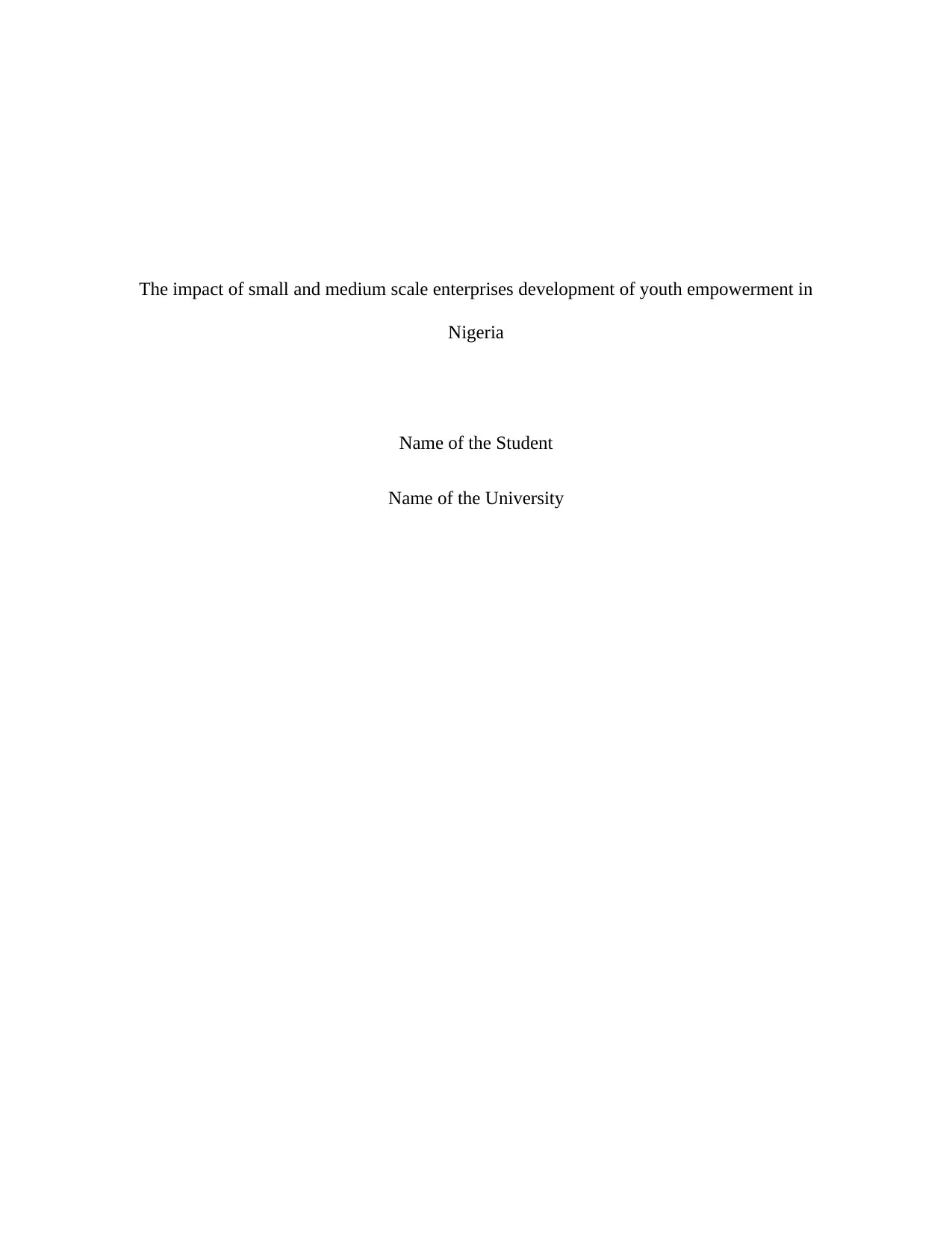
The impact of small and medium scale enterprises development of youth empowerment in
Nigeria
Name of the Student
Name of the University
Nigeria
Name of the Student
Name of the University
Paraphrase This Document
Need a fresh take? Get an instant paraphrase of this document with our AI Paraphraser
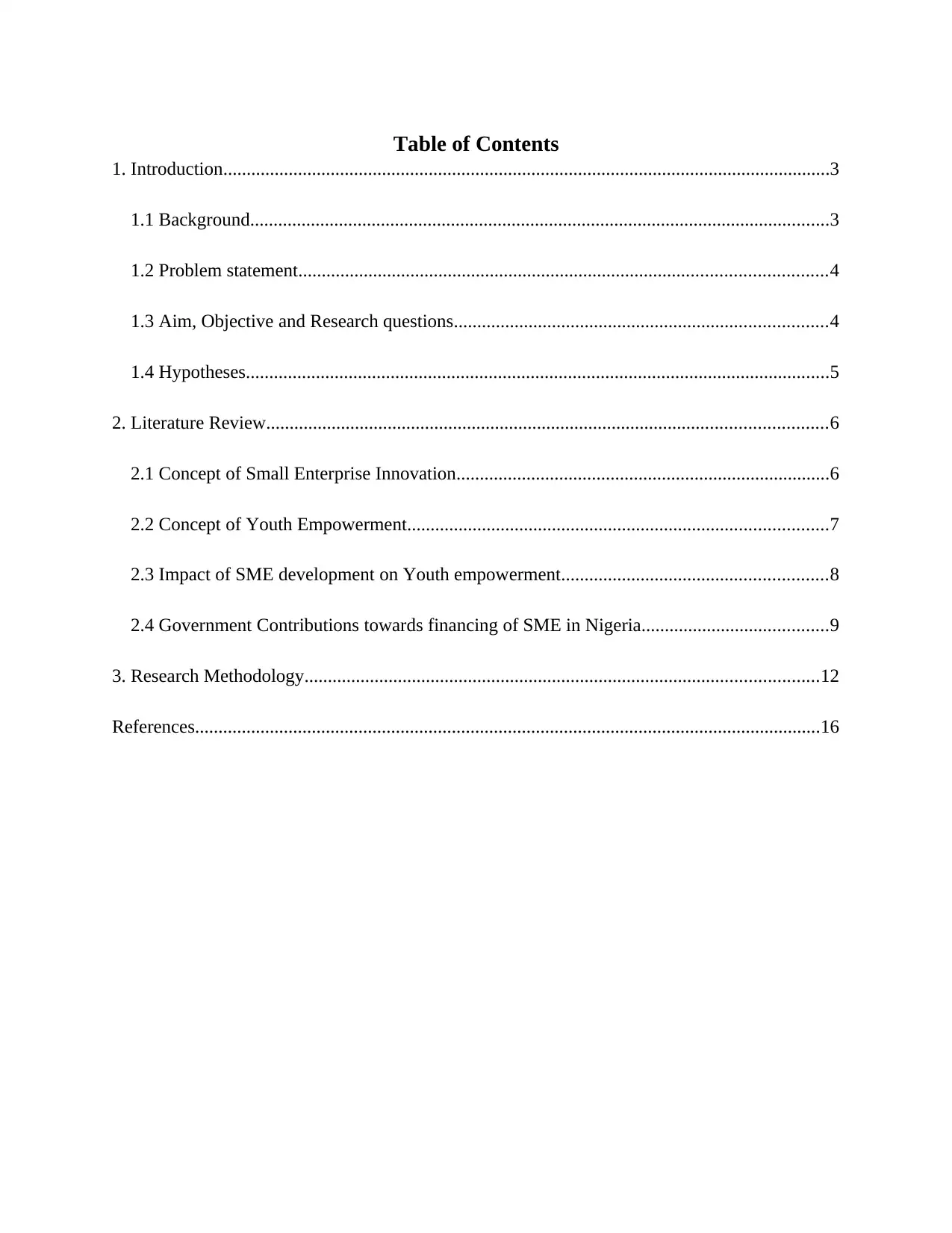
Table of Contents
1. Introduction..................................................................................................................................3
1.1 Background............................................................................................................................3
1.2 Problem statement.................................................................................................................4
1.3 Aim, Objective and Research questions................................................................................4
1.4 Hypotheses.............................................................................................................................5
2. Literature Review........................................................................................................................6
2.1 Concept of Small Enterprise Innovation................................................................................6
2.2 Concept of Youth Empowerment..........................................................................................7
2.3 Impact of SME development on Youth empowerment.........................................................8
2.4 Government Contributions towards financing of SME in Nigeria........................................9
3. Research Methodology..............................................................................................................12
References......................................................................................................................................16
1. Introduction..................................................................................................................................3
1.1 Background............................................................................................................................3
1.2 Problem statement.................................................................................................................4
1.3 Aim, Objective and Research questions................................................................................4
1.4 Hypotheses.............................................................................................................................5
2. Literature Review........................................................................................................................6
2.1 Concept of Small Enterprise Innovation................................................................................6
2.2 Concept of Youth Empowerment..........................................................................................7
2.3 Impact of SME development on Youth empowerment.........................................................8
2.4 Government Contributions towards financing of SME in Nigeria........................................9
3. Research Methodology..............................................................................................................12
References......................................................................................................................................16
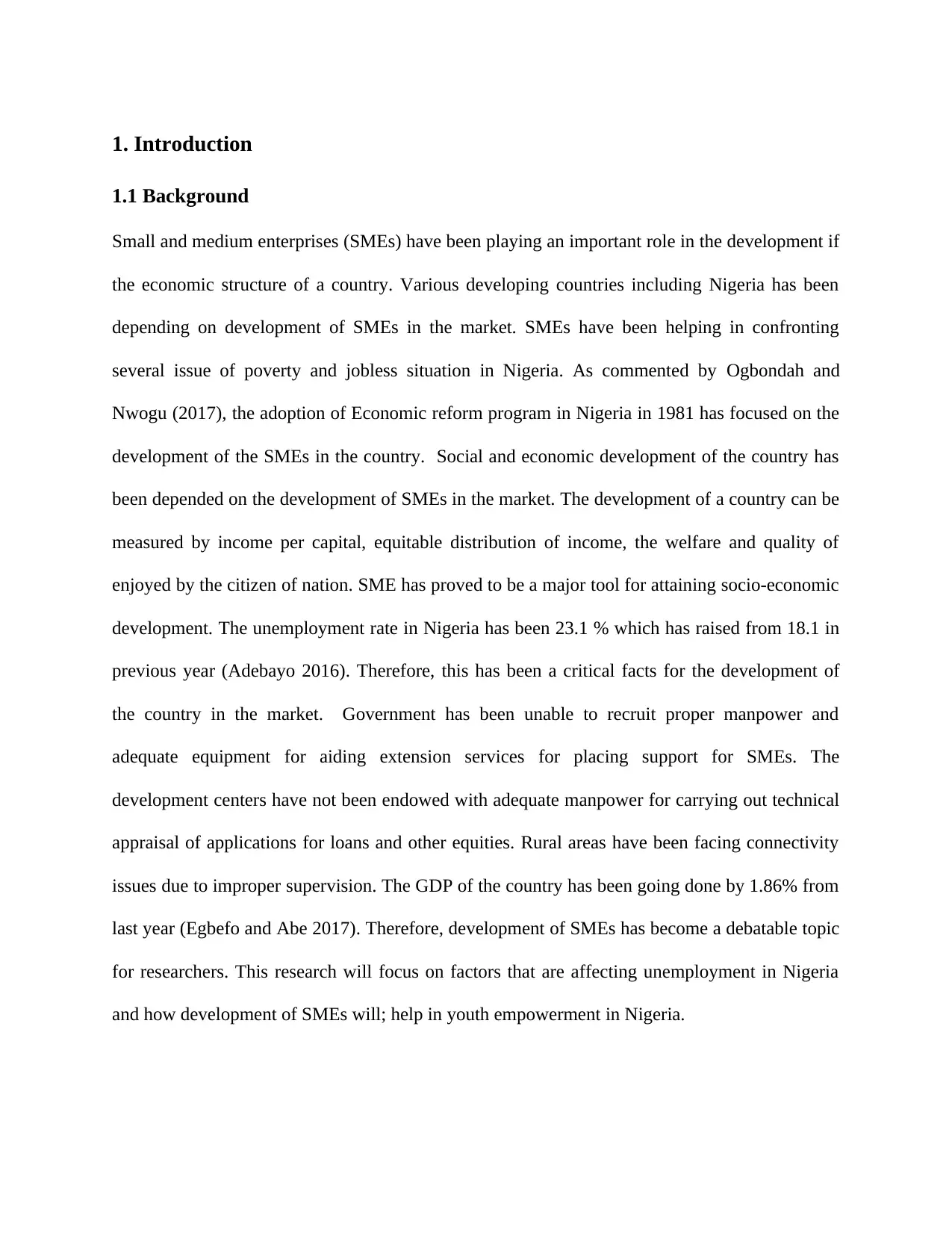
1. Introduction
1.1 Background
Small and medium enterprises (SMEs) have been playing an important role in the development if
the economic structure of a country. Various developing countries including Nigeria has been
depending on development of SMEs in the market. SMEs have been helping in confronting
several issue of poverty and jobless situation in Nigeria. As commented by Ogbondah and
Nwogu (2017), the adoption of Economic reform program in Nigeria in 1981 has focused on the
development of the SMEs in the country. Social and economic development of the country has
been depended on the development of SMEs in the market. The development of a country can be
measured by income per capital, equitable distribution of income, the welfare and quality of
enjoyed by the citizen of nation. SME has proved to be a major tool for attaining socio-economic
development. The unemployment rate in Nigeria has been 23.1 % which has raised from 18.1 in
previous year (Adebayo 2016). Therefore, this has been a critical facts for the development of
the country in the market. Government has been unable to recruit proper manpower and
adequate equipment for aiding extension services for placing support for SMEs. The
development centers have not been endowed with adequate manpower for carrying out technical
appraisal of applications for loans and other equities. Rural areas have been facing connectivity
issues due to improper supervision. The GDP of the country has been going done by 1.86% from
last year (Egbefo and Abe 2017). Therefore, development of SMEs has become a debatable topic
for researchers. This research will focus on factors that are affecting unemployment in Nigeria
and how development of SMEs will; help in youth empowerment in Nigeria.
1.1 Background
Small and medium enterprises (SMEs) have been playing an important role in the development if
the economic structure of a country. Various developing countries including Nigeria has been
depending on development of SMEs in the market. SMEs have been helping in confronting
several issue of poverty and jobless situation in Nigeria. As commented by Ogbondah and
Nwogu (2017), the adoption of Economic reform program in Nigeria in 1981 has focused on the
development of the SMEs in the country. Social and economic development of the country has
been depended on the development of SMEs in the market. The development of a country can be
measured by income per capital, equitable distribution of income, the welfare and quality of
enjoyed by the citizen of nation. SME has proved to be a major tool for attaining socio-economic
development. The unemployment rate in Nigeria has been 23.1 % which has raised from 18.1 in
previous year (Adebayo 2016). Therefore, this has been a critical facts for the development of
the country in the market. Government has been unable to recruit proper manpower and
adequate equipment for aiding extension services for placing support for SMEs. The
development centers have not been endowed with adequate manpower for carrying out technical
appraisal of applications for loans and other equities. Rural areas have been facing connectivity
issues due to improper supervision. The GDP of the country has been going done by 1.86% from
last year (Egbefo and Abe 2017). Therefore, development of SMEs has become a debatable topic
for researchers. This research will focus on factors that are affecting unemployment in Nigeria
and how development of SMEs will; help in youth empowerment in Nigeria.
⊘ This is a preview!⊘
Do you want full access?
Subscribe today to unlock all pages.

Trusted by 1+ million students worldwide
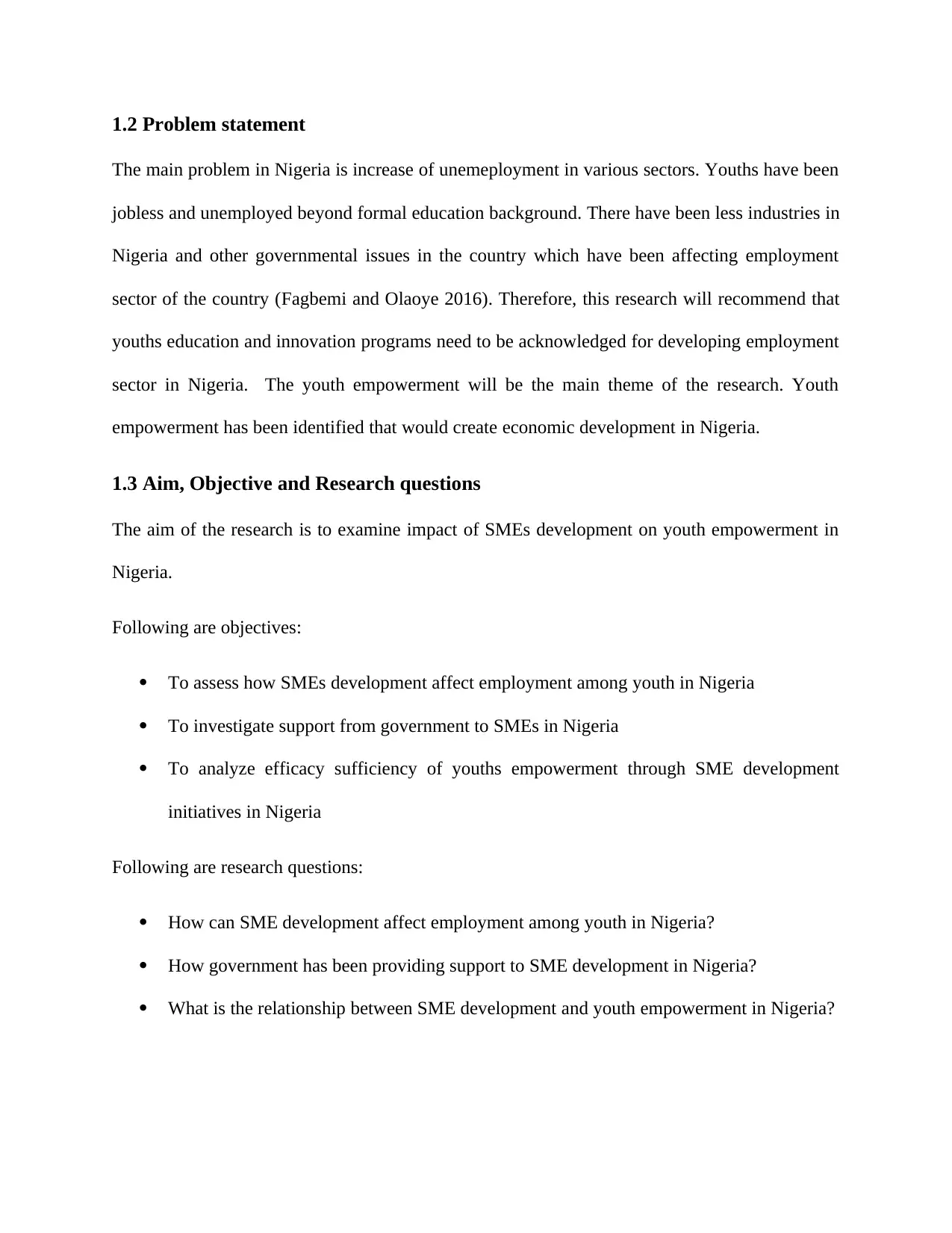
1.2 Problem statement
The main problem in Nigeria is increase of unemeployment in various sectors. Youths have been
jobless and unemployed beyond formal education background. There have been less industries in
Nigeria and other governmental issues in the country which have been affecting employment
sector of the country (Fagbemi and Olaoye 2016). Therefore, this research will recommend that
youths education and innovation programs need to be acknowledged for developing employment
sector in Nigeria. The youth empowerment will be the main theme of the research. Youth
empowerment has been identified that would create economic development in Nigeria.
1.3 Aim, Objective and Research questions
The aim of the research is to examine impact of SMEs development on youth empowerment in
Nigeria.
Following are objectives:
To assess how SMEs development affect employment among youth in Nigeria
To investigate support from government to SMEs in Nigeria
To analyze efficacy sufficiency of youths empowerment through SME development
initiatives in Nigeria
Following are research questions:
How can SME development affect employment among youth in Nigeria?
How government has been providing support to SME development in Nigeria?
What is the relationship between SME development and youth empowerment in Nigeria?
The main problem in Nigeria is increase of unemeployment in various sectors. Youths have been
jobless and unemployed beyond formal education background. There have been less industries in
Nigeria and other governmental issues in the country which have been affecting employment
sector of the country (Fagbemi and Olaoye 2016). Therefore, this research will recommend that
youths education and innovation programs need to be acknowledged for developing employment
sector in Nigeria. The youth empowerment will be the main theme of the research. Youth
empowerment has been identified that would create economic development in Nigeria.
1.3 Aim, Objective and Research questions
The aim of the research is to examine impact of SMEs development on youth empowerment in
Nigeria.
Following are objectives:
To assess how SMEs development affect employment among youth in Nigeria
To investigate support from government to SMEs in Nigeria
To analyze efficacy sufficiency of youths empowerment through SME development
initiatives in Nigeria
Following are research questions:
How can SME development affect employment among youth in Nigeria?
How government has been providing support to SME development in Nigeria?
What is the relationship between SME development and youth empowerment in Nigeria?
Paraphrase This Document
Need a fresh take? Get an instant paraphrase of this document with our AI Paraphraser
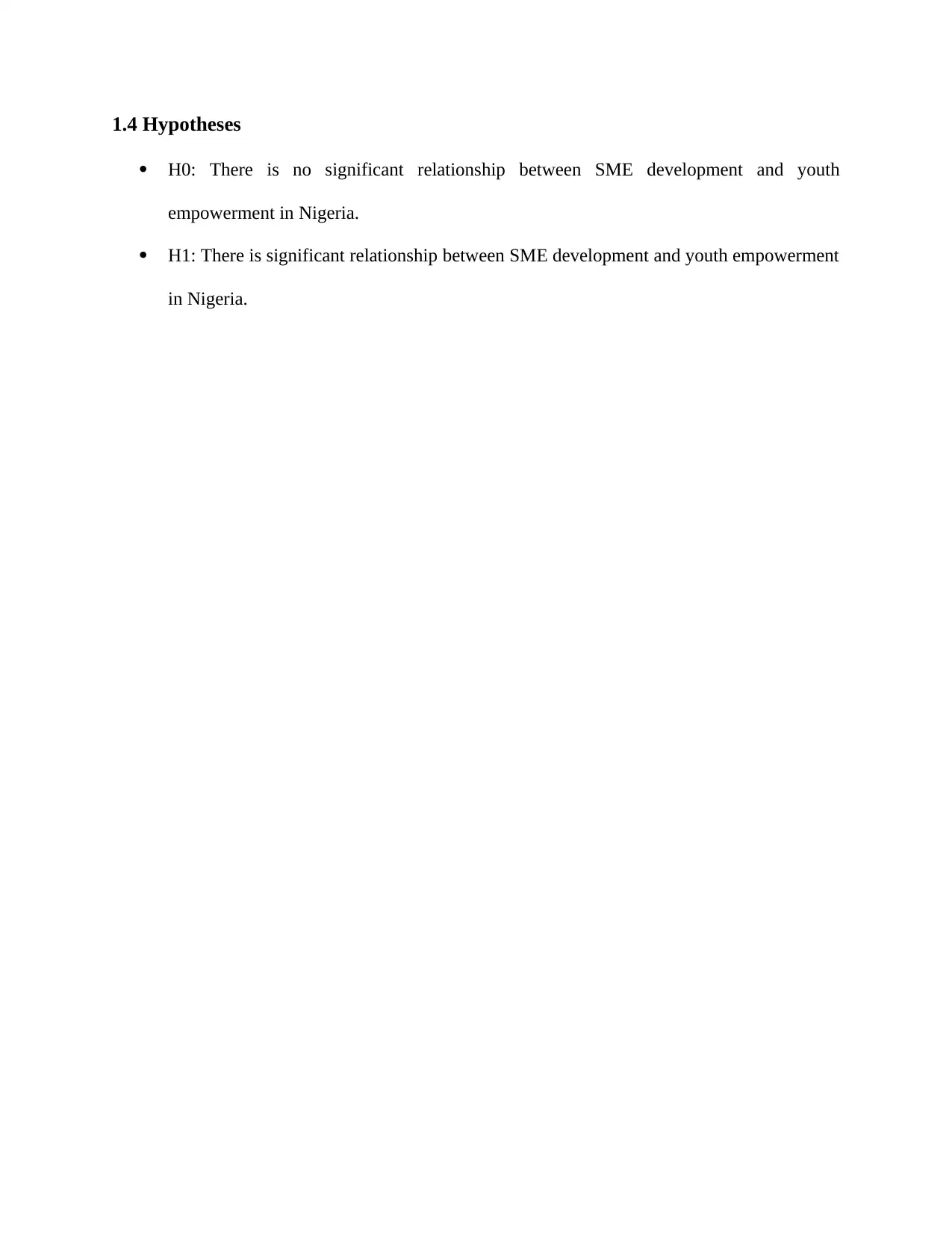
1.4 Hypotheses
H0: There is no significant relationship between SME development and youth
empowerment in Nigeria.
H1: There is significant relationship between SME development and youth empowerment
in Nigeria.
H0: There is no significant relationship between SME development and youth
empowerment in Nigeria.
H1: There is significant relationship between SME development and youth empowerment
in Nigeria.
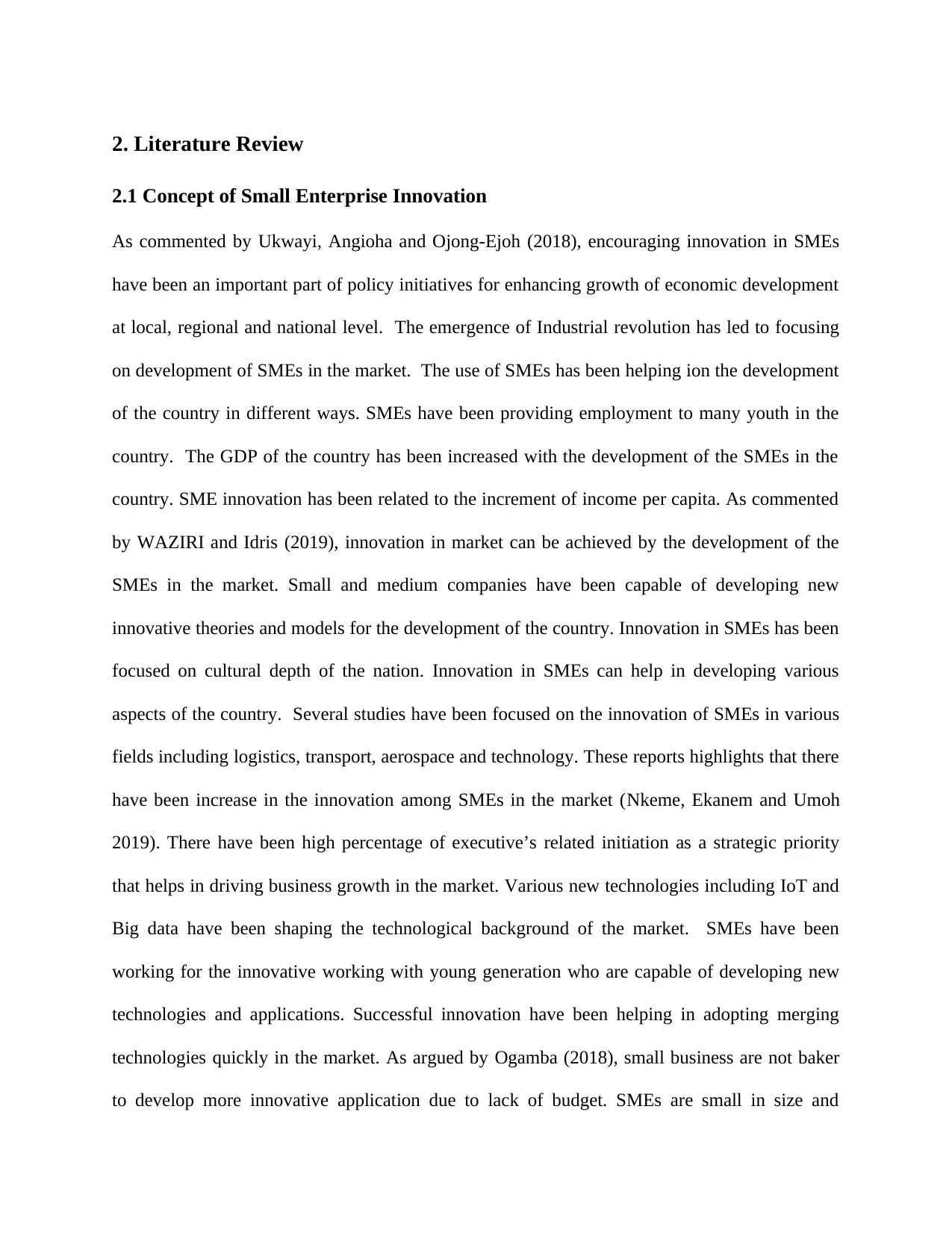
2. Literature Review
2.1 Concept of Small Enterprise Innovation
As commented by Ukwayi, Angioha and Ojong-Ejoh (2018), encouraging innovation in SMEs
have been an important part of policy initiatives for enhancing growth of economic development
at local, regional and national level. The emergence of Industrial revolution has led to focusing
on development of SMEs in the market. The use of SMEs has been helping ion the development
of the country in different ways. SMEs have been providing employment to many youth in the
country. The GDP of the country has been increased with the development of the SMEs in the
country. SME innovation has been related to the increment of income per capita. As commented
by WAZIRI and Idris (2019), innovation in market can be achieved by the development of the
SMEs in the market. Small and medium companies have been capable of developing new
innovative theories and models for the development of the country. Innovation in SMEs has been
focused on cultural depth of the nation. Innovation in SMEs can help in developing various
aspects of the country. Several studies have been focused on the innovation of SMEs in various
fields including logistics, transport, aerospace and technology. These reports highlights that there
have been increase in the innovation among SMEs in the market (Nkeme, Ekanem and Umoh
2019). There have been high percentage of executive’s related initiation as a strategic priority
that helps in driving business growth in the market. Various new technologies including IoT and
Big data have been shaping the technological background of the market. SMEs have been
working for the innovative working with young generation who are capable of developing new
technologies and applications. Successful innovation have been helping in adopting merging
technologies quickly in the market. As argued by Ogamba (2018), small business are not baker
to develop more innovative application due to lack of budget. SMEs are small in size and
2.1 Concept of Small Enterprise Innovation
As commented by Ukwayi, Angioha and Ojong-Ejoh (2018), encouraging innovation in SMEs
have been an important part of policy initiatives for enhancing growth of economic development
at local, regional and national level. The emergence of Industrial revolution has led to focusing
on development of SMEs in the market. The use of SMEs has been helping ion the development
of the country in different ways. SMEs have been providing employment to many youth in the
country. The GDP of the country has been increased with the development of the SMEs in the
country. SME innovation has been related to the increment of income per capita. As commented
by WAZIRI and Idris (2019), innovation in market can be achieved by the development of the
SMEs in the market. Small and medium companies have been capable of developing new
innovative theories and models for the development of the country. Innovation in SMEs has been
focused on cultural depth of the nation. Innovation in SMEs can help in developing various
aspects of the country. Several studies have been focused on the innovation of SMEs in various
fields including logistics, transport, aerospace and technology. These reports highlights that there
have been increase in the innovation among SMEs in the market (Nkeme, Ekanem and Umoh
2019). There have been high percentage of executive’s related initiation as a strategic priority
that helps in driving business growth in the market. Various new technologies including IoT and
Big data have been shaping the technological background of the market. SMEs have been
working for the innovative working with young generation who are capable of developing new
technologies and applications. Successful innovation have been helping in adopting merging
technologies quickly in the market. As argued by Ogamba (2018), small business are not baker
to develop more innovative application due to lack of budget. SMEs are small in size and
⊘ This is a preview!⊘
Do you want full access?
Subscribe today to unlock all pages.

Trusted by 1+ million students worldwide
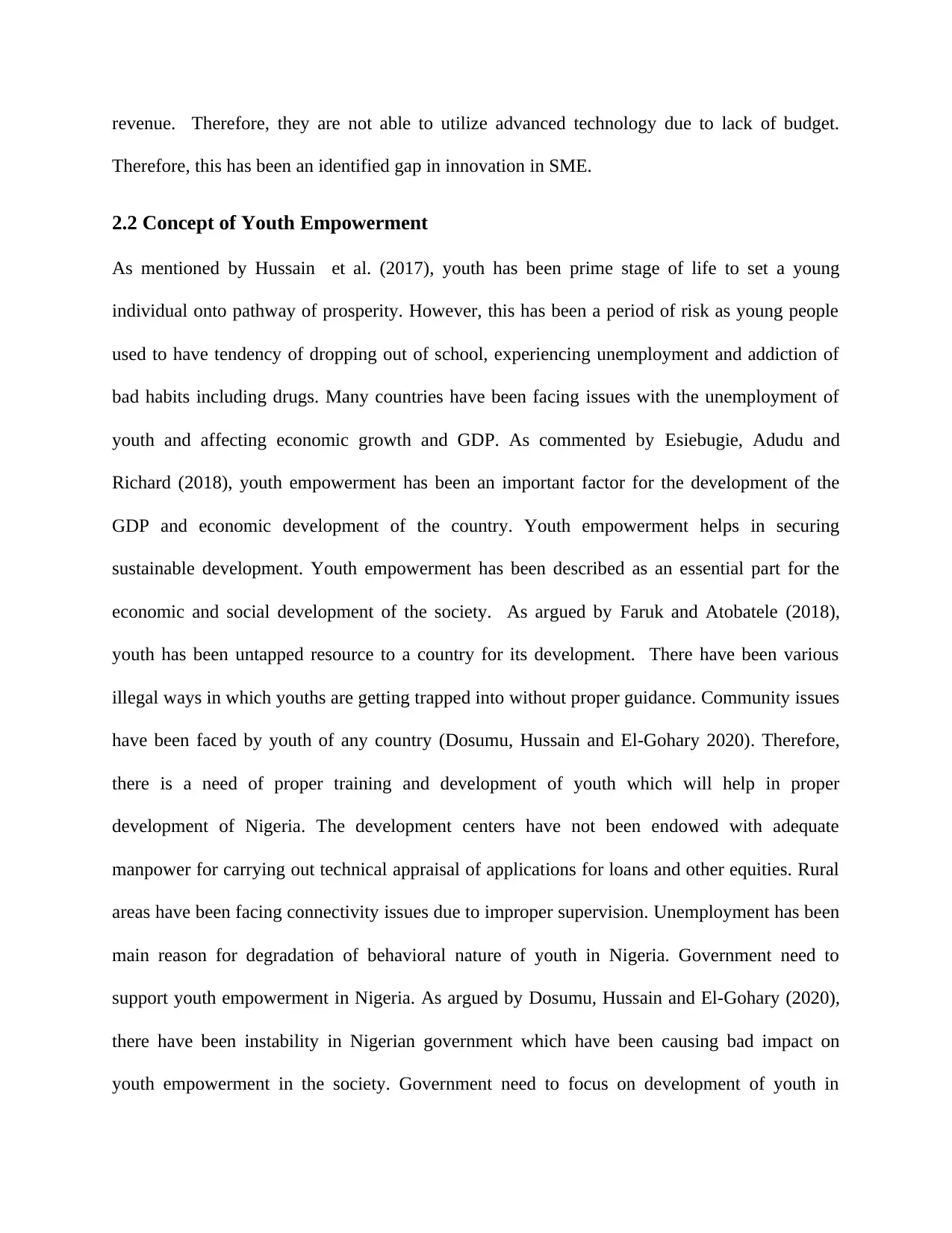
revenue. Therefore, they are not able to utilize advanced technology due to lack of budget.
Therefore, this has been an identified gap in innovation in SME.
2.2 Concept of Youth Empowerment
As mentioned by Hussain et al. (2017), youth has been prime stage of life to set a young
individual onto pathway of prosperity. However, this has been a period of risk as young people
used to have tendency of dropping out of school, experiencing unemployment and addiction of
bad habits including drugs. Many countries have been facing issues with the unemployment of
youth and affecting economic growth and GDP. As commented by Esiebugie, Adudu and
Richard (2018), youth empowerment has been an important factor for the development of the
GDP and economic development of the country. Youth empowerment helps in securing
sustainable development. Youth empowerment has been described as an essential part for the
economic and social development of the society. As argued by Faruk and Atobatele (2018),
youth has been untapped resource to a country for its development. There have been various
illegal ways in which youths are getting trapped into without proper guidance. Community issues
have been faced by youth of any country (Dosumu, Hussain and El-Gohary 2020). Therefore,
there is a need of proper training and development of youth which will help in proper
development of Nigeria. The development centers have not been endowed with adequate
manpower for carrying out technical appraisal of applications for loans and other equities. Rural
areas have been facing connectivity issues due to improper supervision. Unemployment has been
main reason for degradation of behavioral nature of youth in Nigeria. Government need to
support youth empowerment in Nigeria. As argued by Dosumu, Hussain and El-Gohary (2020),
there have been instability in Nigerian government which have been causing bad impact on
youth empowerment in the society. Government need to focus on development of youth in
Therefore, this has been an identified gap in innovation in SME.
2.2 Concept of Youth Empowerment
As mentioned by Hussain et al. (2017), youth has been prime stage of life to set a young
individual onto pathway of prosperity. However, this has been a period of risk as young people
used to have tendency of dropping out of school, experiencing unemployment and addiction of
bad habits including drugs. Many countries have been facing issues with the unemployment of
youth and affecting economic growth and GDP. As commented by Esiebugie, Adudu and
Richard (2018), youth empowerment has been an important factor for the development of the
GDP and economic development of the country. Youth empowerment helps in securing
sustainable development. Youth empowerment has been described as an essential part for the
economic and social development of the society. As argued by Faruk and Atobatele (2018),
youth has been untapped resource to a country for its development. There have been various
illegal ways in which youths are getting trapped into without proper guidance. Community issues
have been faced by youth of any country (Dosumu, Hussain and El-Gohary 2020). Therefore,
there is a need of proper training and development of youth which will help in proper
development of Nigeria. The development centers have not been endowed with adequate
manpower for carrying out technical appraisal of applications for loans and other equities. Rural
areas have been facing connectivity issues due to improper supervision. Unemployment has been
main reason for degradation of behavioral nature of youth in Nigeria. Government need to
support youth empowerment in Nigeria. As argued by Dosumu, Hussain and El-Gohary (2020),
there have been instability in Nigerian government which have been causing bad impact on
youth empowerment in the society. Government need to focus on development of youth in
Paraphrase This Document
Need a fresh take? Get an instant paraphrase of this document with our AI Paraphraser
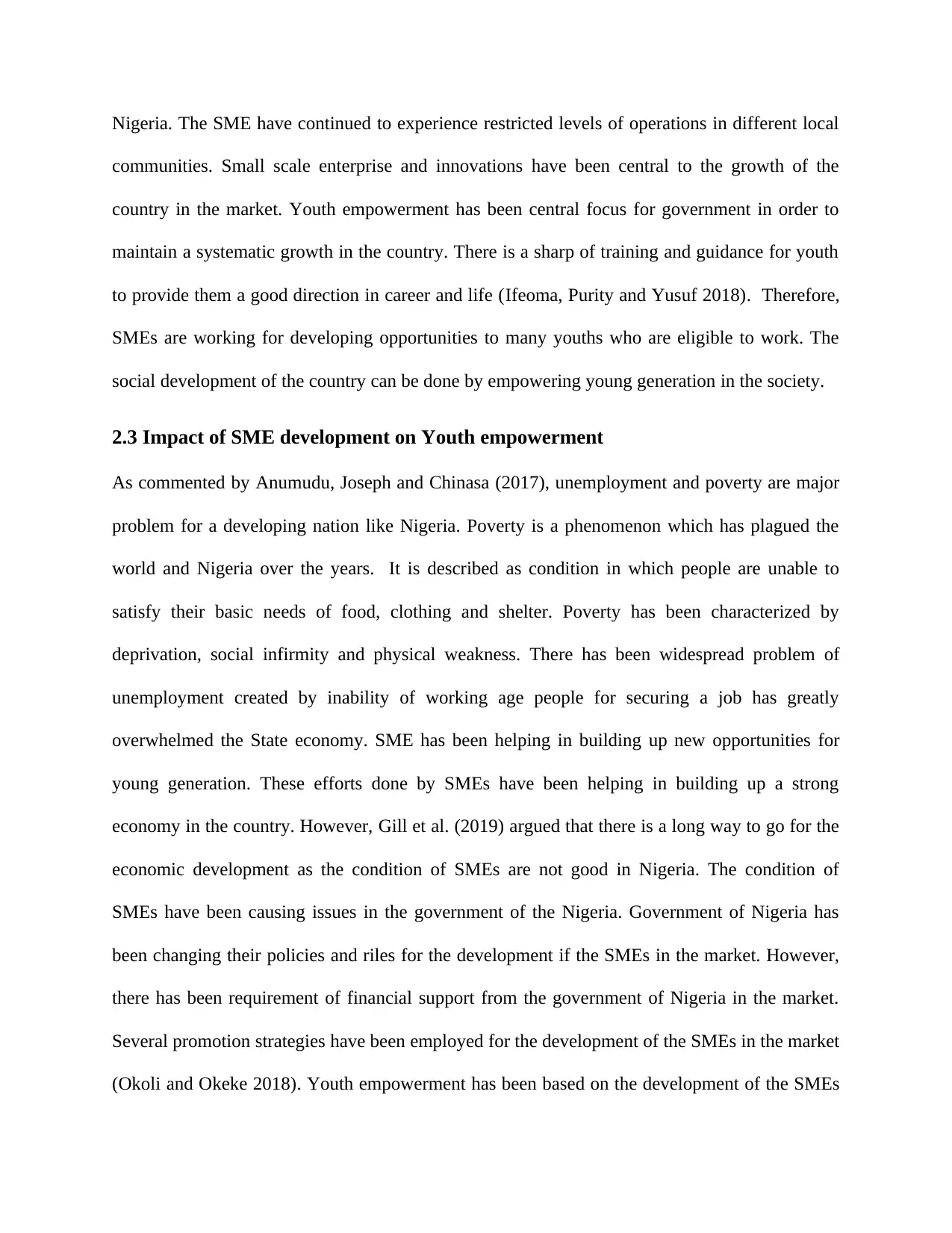
Nigeria. The SME have continued to experience restricted levels of operations in different local
communities. Small scale enterprise and innovations have been central to the growth of the
country in the market. Youth empowerment has been central focus for government in order to
maintain a systematic growth in the country. There is a sharp of training and guidance for youth
to provide them a good direction in career and life (Ifeoma, Purity and Yusuf 2018). Therefore,
SMEs are working for developing opportunities to many youths who are eligible to work. The
social development of the country can be done by empowering young generation in the society.
2.3 Impact of SME development on Youth empowerment
As commented by Anumudu, Joseph and Chinasa (2017), unemployment and poverty are major
problem for a developing nation like Nigeria. Poverty is a phenomenon which has plagued the
world and Nigeria over the years. It is described as condition in which people are unable to
satisfy their basic needs of food, clothing and shelter. Poverty has been characterized by
deprivation, social infirmity and physical weakness. There has been widespread problem of
unemployment created by inability of working age people for securing a job has greatly
overwhelmed the State economy. SME has been helping in building up new opportunities for
young generation. These efforts done by SMEs have been helping in building up a strong
economy in the country. However, Gill et al. (2019) argued that there is a long way to go for the
economic development as the condition of SMEs are not good in Nigeria. The condition of
SMEs have been causing issues in the government of the Nigeria. Government of Nigeria has
been changing their policies and riles for the development if the SMEs in the market. However,
there has been requirement of financial support from the government of Nigeria in the market.
Several promotion strategies have been employed for the development of the SMEs in the market
(Okoli and Okeke 2018). Youth empowerment has been based on the development of the SMEs
communities. Small scale enterprise and innovations have been central to the growth of the
country in the market. Youth empowerment has been central focus for government in order to
maintain a systematic growth in the country. There is a sharp of training and guidance for youth
to provide them a good direction in career and life (Ifeoma, Purity and Yusuf 2018). Therefore,
SMEs are working for developing opportunities to many youths who are eligible to work. The
social development of the country can be done by empowering young generation in the society.
2.3 Impact of SME development on Youth empowerment
As commented by Anumudu, Joseph and Chinasa (2017), unemployment and poverty are major
problem for a developing nation like Nigeria. Poverty is a phenomenon which has plagued the
world and Nigeria over the years. It is described as condition in which people are unable to
satisfy their basic needs of food, clothing and shelter. Poverty has been characterized by
deprivation, social infirmity and physical weakness. There has been widespread problem of
unemployment created by inability of working age people for securing a job has greatly
overwhelmed the State economy. SME has been helping in building up new opportunities for
young generation. These efforts done by SMEs have been helping in building up a strong
economy in the country. However, Gill et al. (2019) argued that there is a long way to go for the
economic development as the condition of SMEs are not good in Nigeria. The condition of
SMEs have been causing issues in the government of the Nigeria. Government of Nigeria has
been changing their policies and riles for the development if the SMEs in the market. However,
there has been requirement of financial support from the government of Nigeria in the market.
Several promotion strategies have been employed for the development of the SMEs in the market
(Okoli and Okeke 2018). Youth empowerment has been based on the development of the SMEs
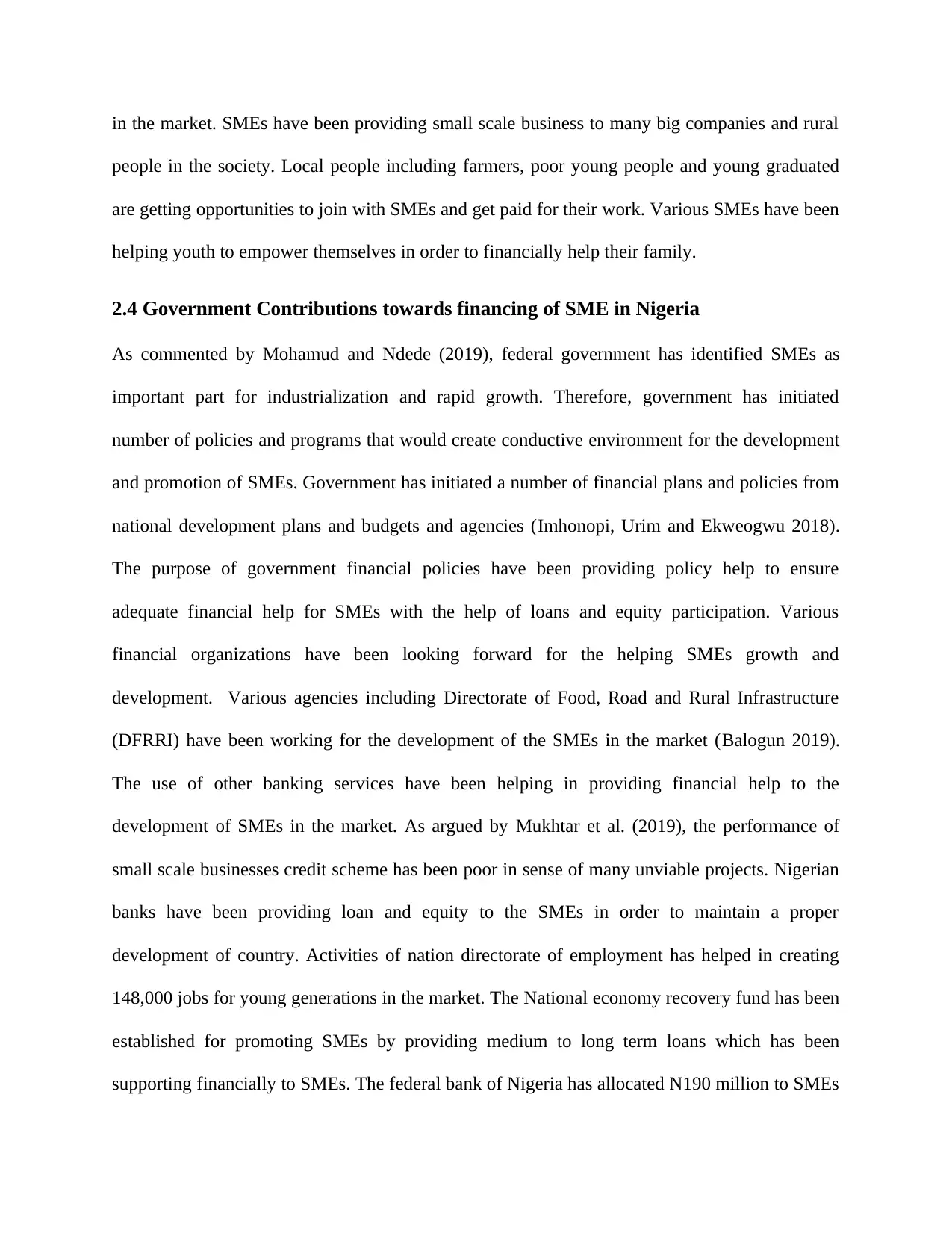
in the market. SMEs have been providing small scale business to many big companies and rural
people in the society. Local people including farmers, poor young people and young graduated
are getting opportunities to join with SMEs and get paid for their work. Various SMEs have been
helping youth to empower themselves in order to financially help their family.
2.4 Government Contributions towards financing of SME in Nigeria
As commented by Mohamud and Ndede (2019), federal government has identified SMEs as
important part for industrialization and rapid growth. Therefore, government has initiated
number of policies and programs that would create conductive environment for the development
and promotion of SMEs. Government has initiated a number of financial plans and policies from
national development plans and budgets and agencies (Imhonopi, Urim and Ekweogwu 2018).
The purpose of government financial policies have been providing policy help to ensure
adequate financial help for SMEs with the help of loans and equity participation. Various
financial organizations have been looking forward for the helping SMEs growth and
development. Various agencies including Directorate of Food, Road and Rural Infrastructure
(DFRRI) have been working for the development of the SMEs in the market (Balogun 2019).
The use of other banking services have been helping in providing financial help to the
development of SMEs in the market. As argued by Mukhtar et al. (2019), the performance of
small scale businesses credit scheme has been poor in sense of many unviable projects. Nigerian
banks have been providing loan and equity to the SMEs in order to maintain a proper
development of country. Activities of nation directorate of employment has helped in creating
148,000 jobs for young generations in the market. The National economy recovery fund has been
established for promoting SMEs by providing medium to long term loans which has been
supporting financially to SMEs. The federal bank of Nigeria has allocated N190 million to SMEs
people in the society. Local people including farmers, poor young people and young graduated
are getting opportunities to join with SMEs and get paid for their work. Various SMEs have been
helping youth to empower themselves in order to financially help their family.
2.4 Government Contributions towards financing of SME in Nigeria
As commented by Mohamud and Ndede (2019), federal government has identified SMEs as
important part for industrialization and rapid growth. Therefore, government has initiated
number of policies and programs that would create conductive environment for the development
and promotion of SMEs. Government has initiated a number of financial plans and policies from
national development plans and budgets and agencies (Imhonopi, Urim and Ekweogwu 2018).
The purpose of government financial policies have been providing policy help to ensure
adequate financial help for SMEs with the help of loans and equity participation. Various
financial organizations have been looking forward for the helping SMEs growth and
development. Various agencies including Directorate of Food, Road and Rural Infrastructure
(DFRRI) have been working for the development of the SMEs in the market (Balogun 2019).
The use of other banking services have been helping in providing financial help to the
development of SMEs in the market. As argued by Mukhtar et al. (2019), the performance of
small scale businesses credit scheme has been poor in sense of many unviable projects. Nigerian
banks have been providing loan and equity to the SMEs in order to maintain a proper
development of country. Activities of nation directorate of employment has helped in creating
148,000 jobs for young generations in the market. The National economy recovery fund has been
established for promoting SMEs by providing medium to long term loans which has been
supporting financially to SMEs. The federal bank of Nigeria has allocated N190 million to SMEs
⊘ This is a preview!⊘
Do you want full access?
Subscribe today to unlock all pages.

Trusted by 1+ million students worldwide
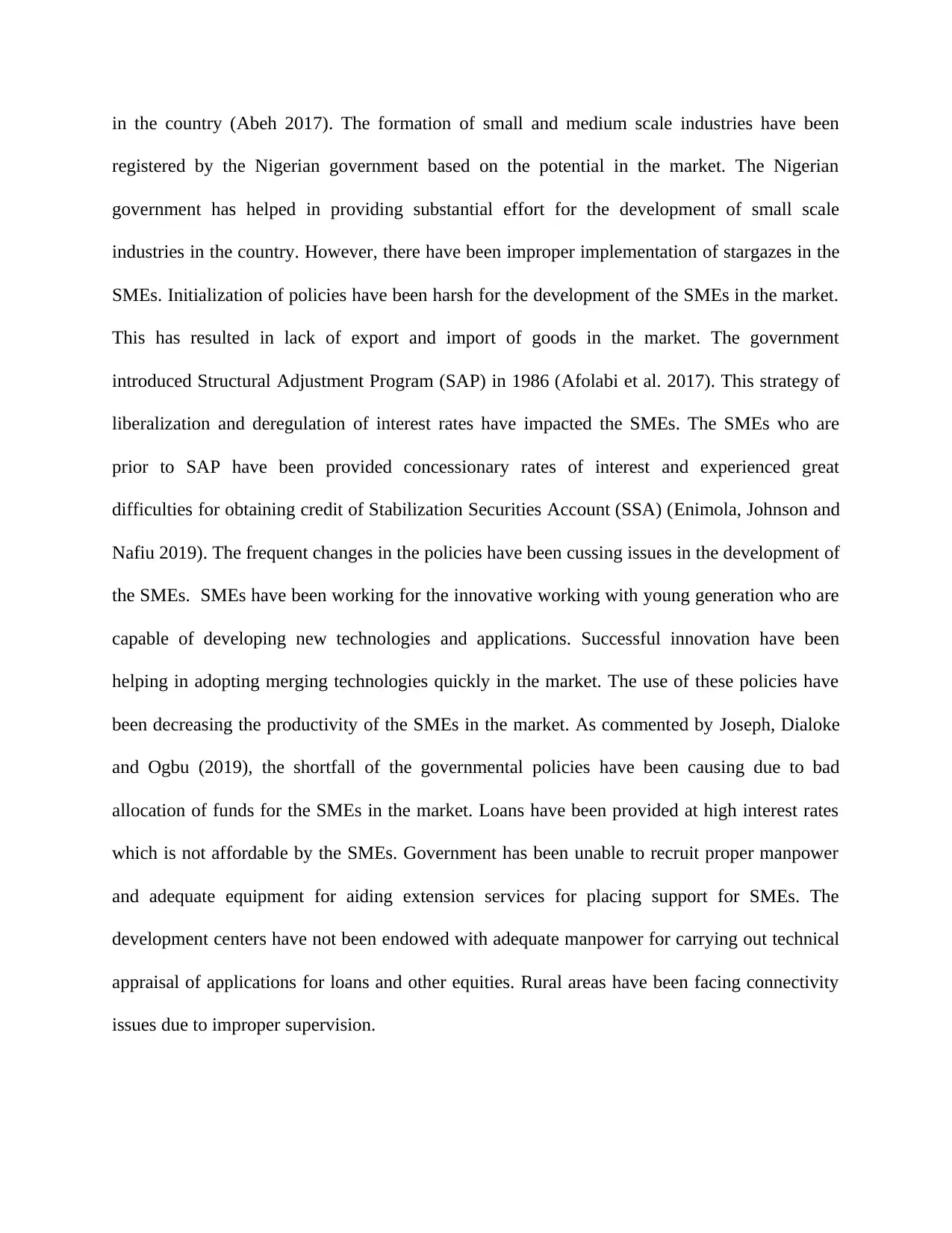
in the country (Abeh 2017). The formation of small and medium scale industries have been
registered by the Nigerian government based on the potential in the market. The Nigerian
government has helped in providing substantial effort for the development of small scale
industries in the country. However, there have been improper implementation of stargazes in the
SMEs. Initialization of policies have been harsh for the development of the SMEs in the market.
This has resulted in lack of export and import of goods in the market. The government
introduced Structural Adjustment Program (SAP) in 1986 (Afolabi et al. 2017). This strategy of
liberalization and deregulation of interest rates have impacted the SMEs. The SMEs who are
prior to SAP have been provided concessionary rates of interest and experienced great
difficulties for obtaining credit of Stabilization Securities Account (SSA) (Enimola, Johnson and
Nafiu 2019). The frequent changes in the policies have been cussing issues in the development of
the SMEs. SMEs have been working for the innovative working with young generation who are
capable of developing new technologies and applications. Successful innovation have been
helping in adopting merging technologies quickly in the market. The use of these policies have
been decreasing the productivity of the SMEs in the market. As commented by Joseph, Dialoke
and Ogbu (2019), the shortfall of the governmental policies have been causing due to bad
allocation of funds for the SMEs in the market. Loans have been provided at high interest rates
which is not affordable by the SMEs. Government has been unable to recruit proper manpower
and adequate equipment for aiding extension services for placing support for SMEs. The
development centers have not been endowed with adequate manpower for carrying out technical
appraisal of applications for loans and other equities. Rural areas have been facing connectivity
issues due to improper supervision.
registered by the Nigerian government based on the potential in the market. The Nigerian
government has helped in providing substantial effort for the development of small scale
industries in the country. However, there have been improper implementation of stargazes in the
SMEs. Initialization of policies have been harsh for the development of the SMEs in the market.
This has resulted in lack of export and import of goods in the market. The government
introduced Structural Adjustment Program (SAP) in 1986 (Afolabi et al. 2017). This strategy of
liberalization and deregulation of interest rates have impacted the SMEs. The SMEs who are
prior to SAP have been provided concessionary rates of interest and experienced great
difficulties for obtaining credit of Stabilization Securities Account (SSA) (Enimola, Johnson and
Nafiu 2019). The frequent changes in the policies have been cussing issues in the development of
the SMEs. SMEs have been working for the innovative working with young generation who are
capable of developing new technologies and applications. Successful innovation have been
helping in adopting merging technologies quickly in the market. The use of these policies have
been decreasing the productivity of the SMEs in the market. As commented by Joseph, Dialoke
and Ogbu (2019), the shortfall of the governmental policies have been causing due to bad
allocation of funds for the SMEs in the market. Loans have been provided at high interest rates
which is not affordable by the SMEs. Government has been unable to recruit proper manpower
and adequate equipment for aiding extension services for placing support for SMEs. The
development centers have not been endowed with adequate manpower for carrying out technical
appraisal of applications for loans and other equities. Rural areas have been facing connectivity
issues due to improper supervision.
Paraphrase This Document
Need a fresh take? Get an instant paraphrase of this document with our AI Paraphraser
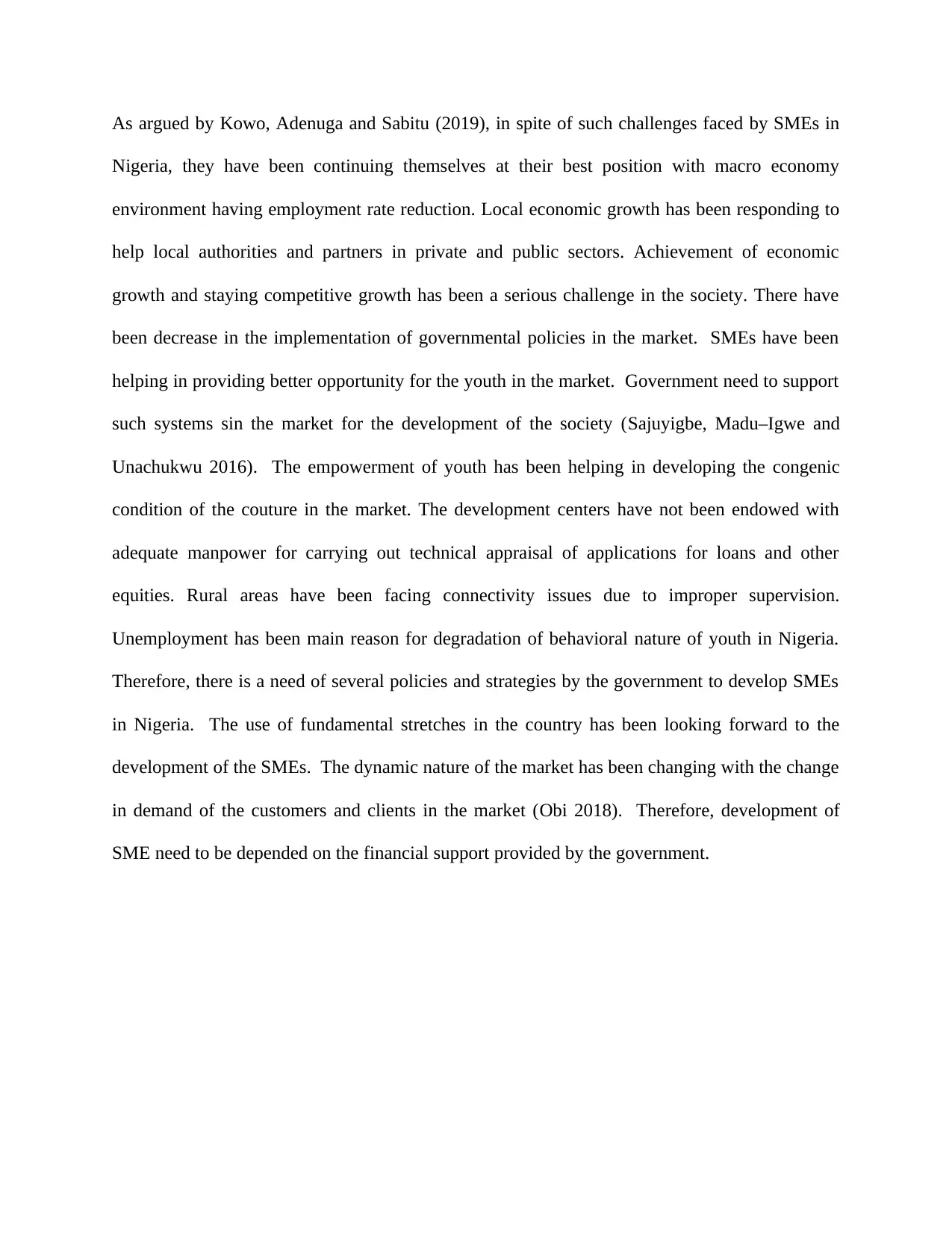
As argued by Kowo, Adenuga and Sabitu (2019), in spite of such challenges faced by SMEs in
Nigeria, they have been continuing themselves at their best position with macro economy
environment having employment rate reduction. Local economic growth has been responding to
help local authorities and partners in private and public sectors. Achievement of economic
growth and staying competitive growth has been a serious challenge in the society. There have
been decrease in the implementation of governmental policies in the market. SMEs have been
helping in providing better opportunity for the youth in the market. Government need to support
such systems sin the market for the development of the society (Sajuyigbe, Madu–Igwe and
Unachukwu 2016). The empowerment of youth has been helping in developing the congenic
condition of the couture in the market. The development centers have not been endowed with
adequate manpower for carrying out technical appraisal of applications for loans and other
equities. Rural areas have been facing connectivity issues due to improper supervision.
Unemployment has been main reason for degradation of behavioral nature of youth in Nigeria.
Therefore, there is a need of several policies and strategies by the government to develop SMEs
in Nigeria. The use of fundamental stretches in the country has been looking forward to the
development of the SMEs. The dynamic nature of the market has been changing with the change
in demand of the customers and clients in the market (Obi 2018). Therefore, development of
SME need to be depended on the financial support provided by the government.
Nigeria, they have been continuing themselves at their best position with macro economy
environment having employment rate reduction. Local economic growth has been responding to
help local authorities and partners in private and public sectors. Achievement of economic
growth and staying competitive growth has been a serious challenge in the society. There have
been decrease in the implementation of governmental policies in the market. SMEs have been
helping in providing better opportunity for the youth in the market. Government need to support
such systems sin the market for the development of the society (Sajuyigbe, Madu–Igwe and
Unachukwu 2016). The empowerment of youth has been helping in developing the congenic
condition of the couture in the market. The development centers have not been endowed with
adequate manpower for carrying out technical appraisal of applications for loans and other
equities. Rural areas have been facing connectivity issues due to improper supervision.
Unemployment has been main reason for degradation of behavioral nature of youth in Nigeria.
Therefore, there is a need of several policies and strategies by the government to develop SMEs
in Nigeria. The use of fundamental stretches in the country has been looking forward to the
development of the SMEs. The dynamic nature of the market has been changing with the change
in demand of the customers and clients in the market (Obi 2018). Therefore, development of
SME need to be depended on the financial support provided by the government.
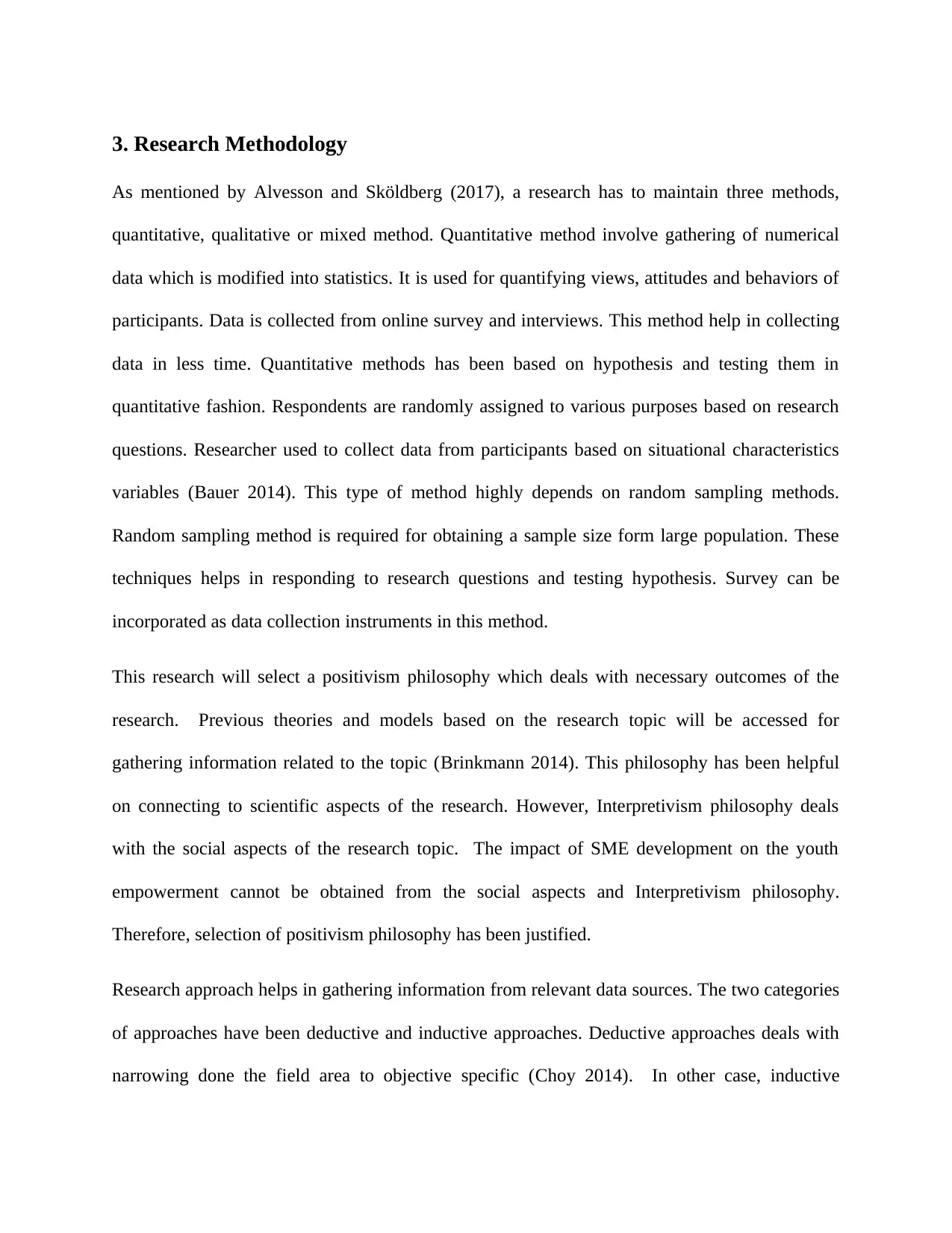
3. Research Methodology
As mentioned by Alvesson and Sköldberg (2017), a research has to maintain three methods,
quantitative, qualitative or mixed method. Quantitative method involve gathering of numerical
data which is modified into statistics. It is used for quantifying views, attitudes and behaviors of
participants. Data is collected from online survey and interviews. This method help in collecting
data in less time. Quantitative methods has been based on hypothesis and testing them in
quantitative fashion. Respondents are randomly assigned to various purposes based on research
questions. Researcher used to collect data from participants based on situational characteristics
variables (Bauer 2014). This type of method highly depends on random sampling methods.
Random sampling method is required for obtaining a sample size form large population. These
techniques helps in responding to research questions and testing hypothesis. Survey can be
incorporated as data collection instruments in this method.
This research will select a positivism philosophy which deals with necessary outcomes of the
research. Previous theories and models based on the research topic will be accessed for
gathering information related to the topic (Brinkmann 2014). This philosophy has been helpful
on connecting to scientific aspects of the research. However, Interpretivism philosophy deals
with the social aspects of the research topic. The impact of SME development on the youth
empowerment cannot be obtained from the social aspects and Interpretivism philosophy.
Therefore, selection of positivism philosophy has been justified.
Research approach helps in gathering information from relevant data sources. The two categories
of approaches have been deductive and inductive approaches. Deductive approaches deals with
narrowing done the field area to objective specific (Choy 2014). In other case, inductive
As mentioned by Alvesson and Sköldberg (2017), a research has to maintain three methods,
quantitative, qualitative or mixed method. Quantitative method involve gathering of numerical
data which is modified into statistics. It is used for quantifying views, attitudes and behaviors of
participants. Data is collected from online survey and interviews. This method help in collecting
data in less time. Quantitative methods has been based on hypothesis and testing them in
quantitative fashion. Respondents are randomly assigned to various purposes based on research
questions. Researcher used to collect data from participants based on situational characteristics
variables (Bauer 2014). This type of method highly depends on random sampling methods.
Random sampling method is required for obtaining a sample size form large population. These
techniques helps in responding to research questions and testing hypothesis. Survey can be
incorporated as data collection instruments in this method.
This research will select a positivism philosophy which deals with necessary outcomes of the
research. Previous theories and models based on the research topic will be accessed for
gathering information related to the topic (Brinkmann 2014). This philosophy has been helpful
on connecting to scientific aspects of the research. However, Interpretivism philosophy deals
with the social aspects of the research topic. The impact of SME development on the youth
empowerment cannot be obtained from the social aspects and Interpretivism philosophy.
Therefore, selection of positivism philosophy has been justified.
Research approach helps in gathering information from relevant data sources. The two categories
of approaches have been deductive and inductive approaches. Deductive approaches deals with
narrowing done the field area to objective specific (Choy 2014). In other case, inductive
⊘ This is a preview!⊘
Do you want full access?
Subscribe today to unlock all pages.

Trusted by 1+ million students worldwide
1 out of 20
Related Documents
Your All-in-One AI-Powered Toolkit for Academic Success.
+13062052269
info@desklib.com
Available 24*7 on WhatsApp / Email
![[object Object]](/_next/static/media/star-bottom.7253800d.svg)
Unlock your academic potential
Copyright © 2020–2026 A2Z Services. All Rights Reserved. Developed and managed by ZUCOL.




